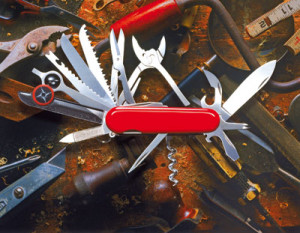
Image: http://www.nature.com/
I've always appreciated the value of having a very broad range of knowledge, but recently I've observed many cases that reminded me how important it is. Growing up I worked on tractors and engines and rebuilt many mechanical devices. Later I learned how to machine metal and weld. As it turned out all of those skills and the knowledge gained have been incredibly helpful in graduate school since I happen to work with large hydraulic and mechanical systems that have all custom parts!
It turns out that as our fields all become more connected through increased interdisciplinary collaboration we all must become an "expert generalist". As geoscientists, we are always faced with writing new code, logging new types of data, or becoming GIS experts. Knowing just a little about many fields opens up entirely new ways that you can start to approach a problem. If that approach looks promising then you can become an "expert" or consult with one, but this novel approach would likely have remained hidden without any knowledge of the field.
The main message of the 99u article (linked at the bottom) is:
One thing that separates the great innovators from everyone else is that they seem to know a lot about a wide variety of topics. They are expert generalists. Their wide knowledge base supports their creativity.
As it turns out, there are two personality traits that are key for expert generalists: Openness to Experience and Need for Cognition.
Let's take a look at the two qualities mentioned and see how we can apply them.
Openness to Experience
Creating new content and ideas is really just a merging of concepts that we already know into a complete framework or mental model of examining the problem at hand. That means that we need a large body of knowledge to draw from. While this sounds like a good idea in practice, it isn't easy to do. We have to be open to meeting with people and learning about concepts that may seem completely irrelevant right now. We have to read papers that are out of our fields and realize that we all work on the same field, just different parts of it.
In an effort to broaden my knowledge I've added a component to my Friday review process: the fun paper reading. Every Friday morning while organizing the end of the week and setting up the next week I find a paper that is out of my research area and read it. These papers range from the geometry of parallel parking, to lightning science, to the fluid dynamics involved with sinking bubbles in a pint of Guinness.
Need for Cognition
The second characteristic described is one that most of us already have. It is the drive to be that person always asking "why?". When driving down the road on a hot summer day and you see the road "shimmer" do you keep going or wonder what is happening? Most of us would go look it up and read all about autoconvection. While some may call this going down the Wikipedia rabbit hole, it is essential to build time into our schedules to allow this kind of free exploration.
What can we as geoscientists take from all of this? We should always be broadening our horizons, making many connections with people in all areas, and not forget that we are all working on the same problem... understanding our world.
99u: Picasso Kepler and the Benefits of Being an Expert Generalist
